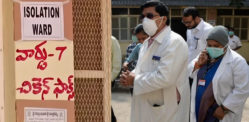“Studies suggest South Asians, especially women do less physical activity”
Common health risks for South Asians are prevalent. There are several health problems known to be associated with their lifestyle.
One of the main contributing factors towards poor health is their lack of a healthy lifestyle. South Asian cuisine is known for its exquisite flavours as well as high oil content.
This increases the risk of obesity which in turn can lead to several other health worries. For example, diabetes, heart problems, cholesterol and so on.
Also, the low levels of exercise heighten the problems. This is due to the absence of physical activity to combat the intake of fatty foods.
There is also a genetic worry concerning health problems in South Asians. The higher the risk rate of developing these health complications, the more important it is for individuals to take precautions.
We present numerous health issues predominant in South Asian communities.
Diabetes

Diabetes is one of the most predominate common health risks for South Asians. There are two types of diabetes to understand:
- Type 1 – the pancreas produces little or no insulin
- Type 2 – the body’s cells do not respond to the insulin properly
The importance of insulin is paramount. It is required as it helps use glucose from food as energy for the body, as well as storing it for upcoming use.
In this instance, for South Asians, type 2 diabetes is of more concern. Diabetes.co.uk states:
“The likelihood of developing type 2 diabetes is reported to be as much as 6 times higher in South Asians than in Europeans.”
This stems from Desi lifestyle choices. Typically, Desi food is high in saturated fats and carbohydrates.
Furthermore, many Desis find it difficult to manage their blood glucose levels. This is amplified due to the culture. For instance, with numerous festivals and occasions, overindulgence is common.
Early diabetes can be ignored, as it is a silent disease. However, as it develops, symptoms become more apparent. The symptoms of type 2 diabetes are as follows:
- Tiredness
- Thirst
- Blurred vision
- Increased need to urinate
Diabetes, if left unmanaged can lead to several other serious health problems. Such as, heart disease, blindness, angina and strokes to name a few.
Therefore, South Asians need to be more aware of what they are putting into their bodies to avoid serious consequences.
Coronary Heart Disease

Coronary heart disease is the narrowing and blockage of the coronary arteries. This is developed over time through the build-up of cholesterol and fat deposit.
Some of the early signs include:
- Chest discomfort
- Tightening of the chest
- Burning sensation
- Numbness
However, these symptoms are often discarded as heartburn or indigestion. Thus, they are often ignored.
Diet management is a crucial factor related to heart disease. Usually, the high levels of carbohydrates and saturated fats found in South Asian cuisine is to blame.
Despite many South Asians adopting a vegetarian diet, not all their food choices are conducive to a healthy heart.
Additionally, the inclusion of Western fast foods increases their already poor diet.
Furthermore, the lack of exercise and obesity are both attributes to this health concern.
Dr Sandy Gupta, for British Heart Foundation, says:
“Studies suggest South Asians, especially women do less physical activity.”
This is a major cause for concern. Even if your Body Mass Index (BMI) is within the average range, exercise is still necessary.
One way to check the condition of your heart would be a Computed Tomography (CT) scan. This test can see inside the blood vessels connected directly to the heart.
In this case, for South Asians, multiple blood vessels are often blocked.
Also, it is important to be aware of your family’s heart disease history as there are chances of genetics playing a part.
Tobacco Health Risks

There is a common misconception that tobacco which is not necessarily inhaled is safer. However, forms of chewing tobacco are just as dangerous to your health.
For example, paan, betel quid or gutkha (a mixture of herbs, spices and tobacco wrapped in betel leaves). These forms of tobacco consumption are popular in South Asian culture.
Yet the health risks are often overlooked. Smokeless tobacco raises the chance of mouth cancer and oesophageal (gullet) cancer.
Alternatively, another form of tobacco that is popular amongst South Asians is shisha, also knowns as a water pipe or hookah.
Nhs.uk explains:
“During 1 session on a water pipe (around 20 to 80 minutes), a person can inhale the same amount as a cigarette smoker consuming 100 or more cigarettes.”
It is important to note, like cigarettes, shisha contains carbon monoxide and other cancerous chemicals.
High Blood Pressure

As the heart pumps blood around the body, it pushes against the sides of the blood vessels. The strength of this pushing effect is recorded as blood pressure.
In this essence, the greater the blood pressure the more dangerous it can be.
As a result, this can damage your heart, conditions of your blood vessels, kidneys, brain and legs as well as increased chances of a stroke.
Particularly, if you are a sufferer of diabetes the potential risk to your heart is greater.
South Asians should consider some lifestyle changes that can help reduce high blood pressure. This includes:
- Reduction of sodium in your diet
- Losing extra weight
- Regular exercise
- Limiting the amount of alcohol intake
- Quitting smoking
Making these changes will not only reduce blood pressure, but they will also help tackle many of the other health concerns.
Cholesterol

Another common health risk for South Asians is high cholesterol. It is a fat-like substance found in all cells in the body.
Cholesterol travels through the blood vessels in small packages called lipoproteins.
Low-density lipoprotein (LDL) is harmful to health. This is because it leads to a build-up of cholesterol in blood vessels.
While high-density lipoprotein (HDL) is beneficial as it carries the cholesterol from other parts of the body back to the liver. Here, the cholesterol is removed from the blood.
Although, South Asians are susceptible to higher risks of cholesterol. This is because of their lack of physical activities and poor diet.
These two contributing factors result in weight gain.
South Asians are at a greater chance of abdominal obesity which increases total cholesterol levels.
An abdominal circumference of 32 inches or more in women and 36 inches or greater for men is a point for concern. Therefore, weight management is crucial.
A major cause for concern would be developing coronary heart disease. Hence, it is necessary to keep cholesterol under control.
Vitamin D Deficiency

Vitamin D deficiency may be considered a trivial problem. However, its repercussions are more severe to your overall general health. It is crucial as it helps regulate your immune system.
Typically, South Asians have darker skin pigmentation. Combined with low sun exposure (due to modest dress coverage or tendency to avoid the sun) this prevents your body from attaining beneficial nutrients.
The common signs and symptoms are:
- Higher risk of infection
- Tiredness and fatigue
- Bone and backache
- Hair loss
- Muscle pain
- Changes in mood
This health concern is more common for South Asians living in the UK, Canada and parts of the USA. This is because of the generally cold weather in these countries.
Also, the oral intake of vitamin D is low in South Asians. This can be compensated by the consumption of vitamin D supplements which are readily available.
Organ and Blood Donation

As a result of the common health risks mentioned above, South Asians put themselves under a greater risk of organ failure.
Transplants are the best match from the same ethnic background.
However, South Asians are at a further disadvantage because they are reluctant to sign up as donors themselves. Therefore, organ availability is limited.
The South Asian patients awaiting organ transplantation in the UK journal states:
“In a study of attitudes to organ donation among South Asians in Southall (Middlesex), 16% of participants carried an organ donor card compared with 28% reported for the general population.”
This is considerably low in comparison to the non-Asians. Some of this stems from the lack of knowledge and awareness of organ donation in South Asian communities.
Additionally, blood donation is also a major problem. The numerous health concerns have a profound impact on the condition of your blood. In several cases, blood transfusions are required.
Although with the lack of South Asian donors this is difficult. Their poor health means that they may not be suitable to donate.
Overall, these common health risks for South Asians arise from dietry intake, lifestyle choices and lack of physical activities. Hence, crucial adjustments must be considered and adhered to.






























































